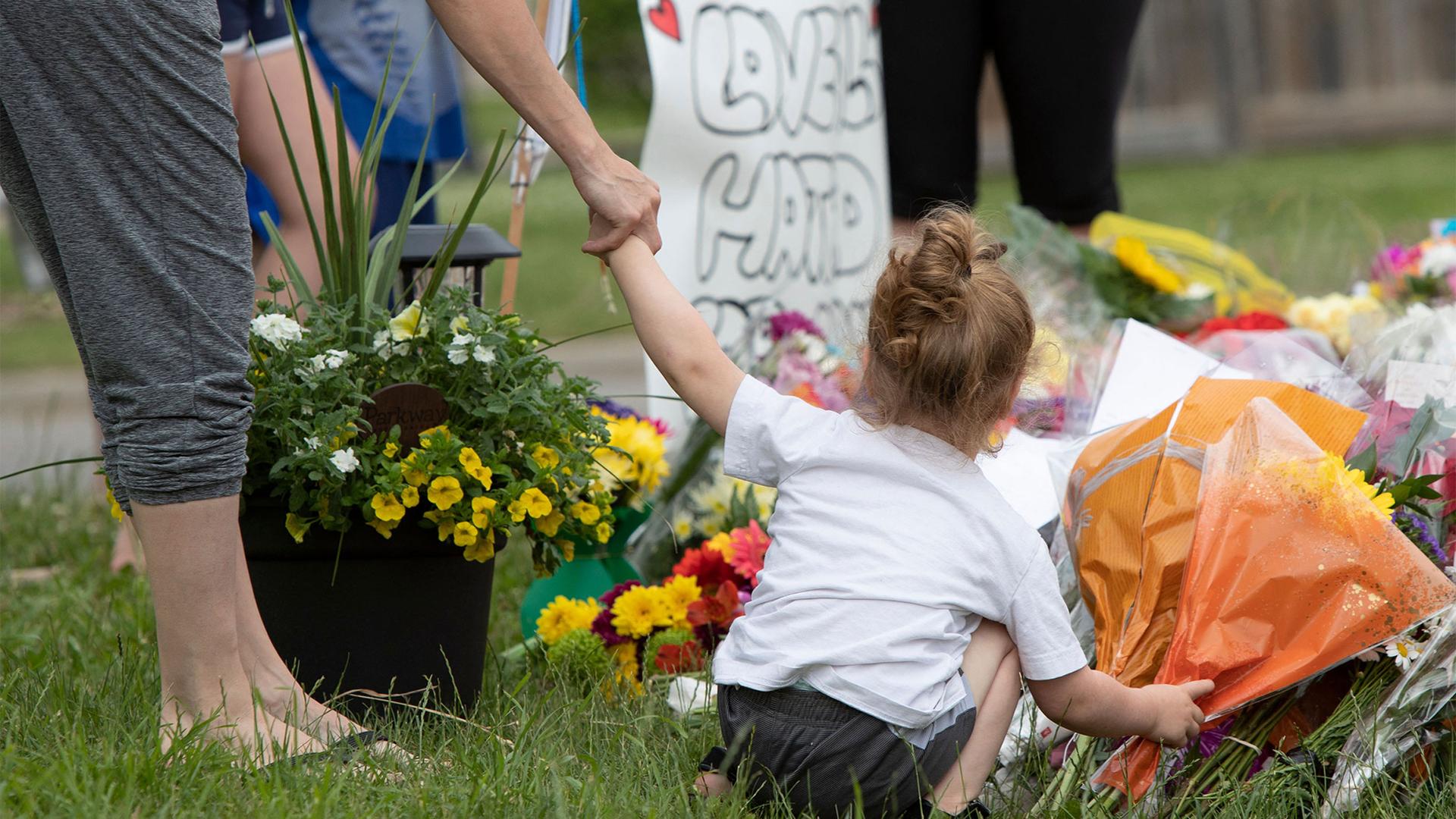Prime Minister Justin Trudeau attended a vigil with several thousand people on Tuesday to honor and mourn the loss of a Canadian Muslim family that was killed over the weekend in a predmeditated attack.
On Sunday, a man rammed a pickup truck into the family while they were standing on a street corner in London, Ontario. Four members of the famiy died, and a fifth person was hospitalized. Police are investigating the incident as a hate crime.
Related: The Proud Boys right-wing group disbands in Canada
“This was a terrorist attack, motivated by hatred, in the heart of one of our communities,” Trudeau told Parliament.
“If anyone thinks racism and hatred don’t exist in this country, I want to say this: How do we explain such violence to a child in a hospital? How can we look families in the eye and say ‘Islamophobia isn’t real?'”
Related: Gruesome boarding school discovery forces Canada to reckon with its cultural genocide history
Canada’s Muslim community has faced several other Islamophobic attacks in recent years, including the horrific mosque shooting in Quebec City a few years ago.
Yusuf Faqiri, the director for public affairs at the National Council of Canadian Muslims, spoke to The World’s host Marco Werman about these incidents and the reality of Islamophobia in Canada.
Marco Werman: Yusuf, what was your initial reaction when you heard about this tragic news from London, Ontario?
Yusuf Faqiri: Thank you for having me, Marco. It’s a difficult time. It was sadness, anger, heartache, shock and bewilderment, how we’re in this situation, right at it again, sir. More than four and a half years after the tragedy that took place in the Sainte-Foy Centre Culturel Islamique de Quebec in January 2017.
And, remind us briefly what happened there.
On Jan. 29, 2017, six Muslims were violently murdered by a terrorist attack committed by Alexandre Bissonnette in the place of worship. And we thought that — never again. But it wasn’t just Quebec, Marco. I deal with stuff in Quebec for the council. But, you know, last year there was a there was a man from our community in Toronto that was murdered in front of a mosque in Toronto. There was a shooting in Montreal in April where somebody shot the mosque 11 times. There’s been beatings, there’s been attacks on members of the Muslim committee in Calgary and Edmonton the last couple of months. It continues in this tragedy with four members of a family perished, [it] hits home quite hard today.
Prime Minister Justin Trudeau has expressed anger. He said it was a terrorist attack motivated by racism. What should, do you think, the Canadian government be doing to combat this?
They need to work with our partners. The Canadian government did something important earlier this year when they recognized that Jan. 29 is the national day of action against hate and Islamophobia. But we need a national strategy on Islamophobia, Marco, across the nation, across the provinces, at the local and federal level. People will need to call this for what it is. You know, there are certain provinces where the premiers deny Islamophobia exists. That in itself is a problem, Marco. And I want to be clear here, sir. This fight against Islamophobia is related to anti-Semitism, and against anti-Sikhism, and the racism against Asian Canadians. And we need a collective effort. This should not just fall on the Muslim community.
So, if we are to get to the root of this hate, what do you think is behind this rise in Islamophobia and violence that we’ve been witnessing in Canada?
There’s a direct link with all the terrorist acts that were committed in the last few years by white supremacists, right? If you look at Alexandre Bissonnette, or the tragedy that felled Mr. [Mohamed-Aslim] Zafis, in Toronto, or, even now, as you know, the London police have called us a hate-motivated crime. [It] has to be understood that there’s this notion of a direct-link nexus between white supremacy and Islamophobia.
Canada, as you know, prides itself on being a multicultural society. I mean, that’s also the reputation it seems to have globally. But is there something going on beneath the surface? What do we not understand about Canada?
We have to understand that there is a fundamental problem going on with this nexus of white supremacy and Islamophobia. And we have to work together collectively to dismantle [it]. And this is very important. And one of the issues that often happens, Marco, is that there’s a discourse at certain political levels that sometimes adds to these notions of the Islamophobia that I mentioned earlier in our conversation.
Do you think Justin Trudeau’s government is doing enough? Are they calling out leaders who deny Islamophobia?
Well, I will say this, Marco, is that more work has to be done on all political levels. And I believe that our work is far from over, sir. I will say that.
As I said, you’re heading to London for the vigil. What words, what advice do you have, Yusuf, for Canadian Muslims who want to move forward after these events?
We wanted to say never again. But we want to say that we stand with you, and will continue to work with you, and that we’re here for you, and we’ll continue to fight with you side-by-side in building that inclusive society that’s tempered with justice.
This interview has been lightly edited and condensed for clarity.AP contributed to this report.
